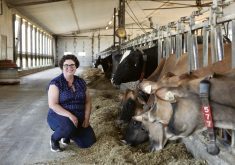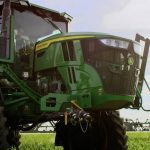Looking for a new career to diversify farm income and provide extra job satisfaction? Maybe you could become a farm advisor.
After all, you grew up on the family farm, you have production down to a science, you’ve taken over from Mom and Dad and had to learn all about farm management, human resources, business planning and so many other things.
So, that makes you an expert, doesn’t it? Surely all that wisdom and experience is worth something, and you can share it by advising other farm owners and managers, right?
Read Also

Sibling squeeze part 6: The emotional stakes of a family legacy
The final instalment in a six-part series exploring the challenges of sibling conflict and the effect it can have on…
Well … yes. And no. Not everyone can be a good teacher or mentor, and not every farmer can be a good advisor. But if you do think you have what it takes, how would you actually get ready to set up business? What pathways lead you into the sector, and what training is around to qualify you to advise others?
Training available but scattered
While there is no single degree or program that everyone who wants to call themselves a farm advisor has to ace, there are a number of training programs available to farm advisors, many of which depend on the type of advisor a person wants to be.
For instance, Dick Wittman (of Dick Wittman Consulting in Idaho) is the former manager and now board chair of a 20,000-acre dryland crop, range cattle and timber operation who provides a training program for farm advisors that covers the whole gamut of farm business management including farm transition.
As well, the International Farm Transition Network operating out of the University of Wisconsin offers a farm succession co-ordinator certification program, and many farm transition advisors have completed the family enterprise advisor program, receiving the designation offered by Family Enterprise Canada.
The Canadian Association of Farm Advisors (CAFA) supports a growing network of farm advisors through the national association and regional chapters who host a number of learning opportunities for farm advisors on topics such as tax planning and farm transition.
Is a farm background a prerequisite?
In most cases, yes, farm experience is a big help, but it also depends on what the area of specialty is. The team approach to farm advising that has become so prevalent today makes it possible to tap into individuals who didn’t necessarily grow up on a farm, although they have to be willing to learn.
“One of the better advisors in Saskatoon right now is a younger person who was not raised on a farm,” says Stan MacEwen, senior associate with Laskowski and Wright LLP in Warman, Sask., who has been a farm advisor for more than 20 years.
“He’s a tax accountant who has taken an interest in agriculture and who has the desire and commitment to learn and listen. He doesn’t advise on production, or legal matters, but knows who to ask if the client is having trouble. He surrounds himself with a team that he goes to.”
But, when dealing with family farm transitions, it may be harder. A deep understanding of family dynamics and how a farm functions only comes from living the life.
“Being born and raised on the farm gives you the first-hand knowledge of how farms operate and how some of those behind-the-scenes decisions are made,” says Andrew Leach, a farm advisor with Farm Life in Ontario, who grew up on a dairy farm and whose family still farms today.
“It gives you an awareness of the stresses and conflicts that are on the farm and how they affect the family unit. That’s an asset that can’t be taught,” Leach says. “There’s the technical knowledge, the views from an accounting, legal or tax standpoint to be an effective succession planner. You don’t need to be born on a farm to apply those theories, but to really get a full understanding and complete picture of how a farm operates, it does help to have lived it.”
That said, Leach has also developed some valuable leadership and communications skills by not being involved in agriculture for a while.
Out of university, where he graduated with a commerce degree specializing in sports administration, he landed his dream job: a senior management position with the Ottawa Senators NHL team. He also worked for a couple of years at Trent University managing a team of staff.
“It all layers on top of my experience of growing up in agriculture … it mobilized more of the vast array of communication styles, management practices, team work strategies that are present in today’s workplace,” Leach says.
“My work outside of that has given me experience working with a more diverse range of team members, with different backgrounds, beliefs and perspectives,” Leach says. “It’s a great asset to bring into these farm family discussions, just being able to experience more communication styles because communication is really at the root of what we do.”
Getting the basics
So, although a farm background is an asset in most cases to a farm advisor, or for any role on the farm for that matter, agriculture as a whole has a labour shortage. That means there will need to be more investment and work to attract people from non-traditional ag backgrounds.
“We need to hire a lot more people that are not the traditional aggies and farm kids because there are not enough of them to fill all the positions we have in our agri-food sector,” says Crystal Mackay, a recognized communications leader who has been involved in the agri-food industry for more than 25 years.
“We need new and different thinking to help advance our sector, so it’s not just the number of people, but different types of people with different backgrounds.”
That need prompted Mackay, and her colleague, Andrew Campbell, to do some research to identify the skill and knowledge gaps that people entering the industry generally have, and to found Utensil.ca in summer 2020 to help fill those gaps.
“What someone new to the sector needs is quick, on-demand information that’s practical,” Mackay says. In fact, the new resource isn’t limited to newcomers to the industry, but recognizes that not everyone involved in the ag sector understands all aspects of it. “A farm kid that comes from a dairy in the Ottawa Valley doesn’t necessarily understand grain farming in Western Canada or potato farming on P.E.I. Agriculture is so diverse and changing quickly too.”
Utensil has developed several resources that provide a basic knowledge and context for agriculture aimed at those with little to no experience entering the field. They include a plain language guide that has over 700 terms, jargon and acronyms, and an online training tool called “So … Your Client is a Farmer” developed by Saskatchewan grain farmer, Cherilyn Nagel, that helps increase comfort and confidence for those working with, and for, farmers and farm organizations.
There is also a library of short videos about diverse topics like antibiotic use on farms, how auctions work or the difference between grass-fed and grain-fed beef. For a deeper dive into the various topics, the team is adding training modules that individuals, organizations or businesses can access, and is starting to offer coaching and mentors from actual experts to further support learning and on boarding.
“There are a lot of baby boomers about to retire and they have been serving as mentors, and there is a big gap between them and new hires,” Mackay says.
More emphasis is being put on hiring new grads for agricultural jobs, but once they’re hired, they find their education hasn’t prepared them for the life, and in many cases they aren’t being mentored or coached to learn on-the-job the way that their predecessors often were.
“Whenever I ask people about their on boarding process they tend to groan, and it doesn’t matter if it’s a small non-profit or a major corporation, everyone says it could be better,” Mackay says. “So, we are trying to provide some tools to help them be more successful.”
Are we going to have enough farm advisors to go around in the future?
“With the work being done by CAFA to facilitate advisor training and ensure advisors across Canada have agricultural knowledge, we’re positioned for success,” says Heather Watson, executive director of Farm Management Canada. “Any farmer will tell you: it is vital that farm advisors understand the nature of the agricultural businesses they are serving.”
Watson is not so sure about farm transition advisors, though. “I think we need to continue to promote the vital and unique role of farm transition advisors as the quarterbacks of farm transition, and support efforts to bring farm transition advisor training to Canada.”
We need more young farm advisors
There is an urgent need for more young people to enter the farm advisor sector, not only to fill the gap left by farm advisors who are retiring after having been in the industry for many years, but to relate more closely to the needs of the younger generation who are taking over farm enterprises.
Andrew Leach, a 29-year-old farm advisor with Farm Life in Ontario, specializes in working with the next generation of farm owners and managers.
“I focus on succession and estate planning, but my particular specialty is working with that next generation of farmers,” Leach says. “I’ve worked with farmers of all ages but I connect best with the under-40 crowd, because we are in the same phase of life.”
When he works with farm families, Leach deals with both generations to create succession pathways, but then continues to work with the next generation to help them achieve their milestones along the way.
“It’s not just a case of creating a financial plan and how to get the farm from generation to generation, it’s how do you achieve some of the milestones, and get the training and coaching for the next generation that helps them be ready to take over and operate the farm,” Leach says.
In the past, says Leach, a lot of the focus in transition planning has been on the financial aspect, but in reality, there are many other layers in terms of ensuring the readiness of the next generation to take over and the outgoing generation to let go.
“A big focus of how we approach farm succession is from the family harmony side,” he says. “What we’re looking to do is make sure that if a family is eating Sunday lunch together before the farm is transitioned, that they can still do that afterwards, that there’s no resentment among siblings, and that non-farming kids are taken care of, and the whole thing flows as one cohesive plan.”
It may also be that younger farmers know the extent of their limitations and are more inclined to ask for help when they need it than their more independent parents or grandparents were.
“A lot of young farmers who are going to take over the family business have been to university and taken ag business courses or they’ve taken other agriculture management courses to extend their knowledge, and they get good insights from other smart young farmers as well,” says Liz Robertson, executive director of the Canadian Association of Farm Advisors. “They’re going back and saying, I know I can’t do it all, I’ve got to hire professionals to work with just like any other multimillion-dollar business in any town or city.”
















